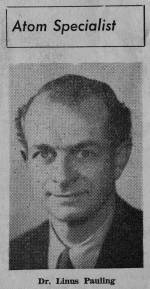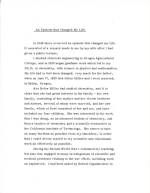|
Through it all, Pauling kept talking about the A-Bomb to local groups. Ava Helen accompanied
her husband to all his speeches, sat in the front row, and listened carefully. She
also kept an eye on the audiences, gauging what worked when he delivered a speech
and what did not. Then she told him what she thought. "You’re not convincing," she
said. She told him that when he spoke he was deferring too much to other authorities
and, as a result, "You give the audience the impression that you are not sure about
what you are saying." Sometimes his talks were too dry and technical.
Pauling was proud of his speaking abilities -- he had excelled in rhetoric as a college
student, and was renowned as a great teacher of chemistry -- so he decided to work
harder on his A-Bomb speeches. He reviewed the field in greater depth, exploring not
only the science and technology of the new weapon, but also its politics and economics,
the ways in which it was being used and overseen by the government, how it was employed
as a tool of global diplomacy, and why it mattered to people in everyday life. He
began absorbing everything he could find in newspapers and magazines. He paid special
attention to what the scientists in the discussion groups and the FAS were saying.
After a few months, he began speaking with a new passion and sense of authority. His
talks caught fire.
|
|
Click images to enlarge

"Dr. Pauling Will Address AGS Society." March 26, 1947.

"An Episode that Changed My life." 1980s.
"For years I devoted more than half my time, perhaps, to giving hundreds of lectures
[on peace]... But in the earlier years, especially to studying international affairs
and social, political and economic theory to the extent that enabled me ultimately
to feel that I was speaking with the same authority as when I talked about science.
This is what my wife said to me back around 1946, that if I wanted to be effective,
I’d have to reach the point where I could speak with authority about these matters..."
|

